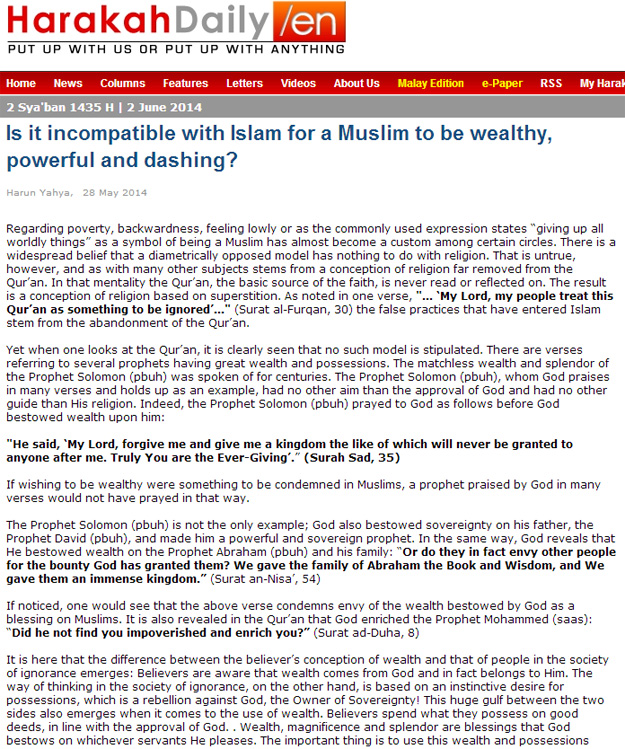
Regarding poverty, backwardness, feeling lowly or as the commonly used expression states “giving up all worldly things” as a symbol of being a Muslim has almost become a custom among certain circles. There is a widespread belief that a diametrically opposed model has nothing to do with religion. That is untrue, however, and as with many other subjects stems from a conception of religion far removed from the Qur’an. In that mentality the Qur’an, the basic source of the faith, is never read or reflected on. The result is a conception of religion based on superstition. As noted in one verse, "... ‘My Lord, my people treat this Qur’an as something to be ignored’..." (Surat al-Furqan, 30) the false practices that have entered Islam stem from the abandonment of the Qur’an.
Yet when one looks at the Qur’an, it is clearly seen that no such model is stipulated. There are verses referring to several prophets having great wealth and possessions. The matchless wealth and splendor of the Prophet Solomon (pbuh) was spoken of for centuries. The Prophet Solomon (pbuh), whom God praises in many verses and holds up as an example, had no other aim than the approval of God and had no other guide than His religion. Indeed, the Prophet Solomon (pbuh) prayed to God as follows before God bestowed wealth upon him:
"He said, ‘My Lord, forgive me and give me a kingdom the like of which will never be granted to anyone after me. Truly You are the Ever-Giving’.” (Surah Sad, 35)
If wishing to be wealthy were something to be condemned in Muslims, a prophet praised by God in many verses would not have prayed in that way.
The Prophet Solomon (pbuh) is not the only example; God also bestowed sovereignty on his father, the Prophet David (pbuh), and made him a powerful and sovereign prophet. In the same way, God reveals that He bestowed wealth on the Prophet Abraham (pbuh) and his family: “Or do they in fact envy other people for the bounty God has granted them? We gave the family of Abraham the Book and Wisdom, and We gave them an immense kingdom.” (Surat an-Nisa’, 54)
If noticed, one would see that the above verse condemns envy of the wealth bestowed by God as a blessing on Muslims. It is also revealed in the Qur’an that God enriched the Prophet Mohammed (saas): “Did he not find you impoverished and enrich you?” (Surat ad-Duha, 8)
It is here that the difference between the believer’s conception of wealth and that of people in the society of ignorance emerges: Believers are aware that wealth comes from God and in fact belongs to Him. The way of thinking in the society of ignorance, on the other hand, is based on an instinctive desire for possessions, which is a rebellion against God, the Owner of Sovereignty! This huge gulf between the two sides also emerges when it comes to the use of wealth. Believers spend what they possess on good deeds, in line with the approval of God. . Wealth, magnificence and splendor are blessings that God bestows on whichever servants He pleases. The important thing is to use this wealth and possessions bestowed by God in such a way as to be appropriately lawful, to use it properly and to be grateful for it, to give thanks for the blessing of God.
However, we must not forget that this world is a place of testing. The extent of one’s patience and fortitude in the face of various troubles and difficulties determine the depth of one’s faith. God may therefore place various events and climates in believers’ path in order to reveal their superior qualities and reward them in His Sight. God may test believers’ fortitude and trust in Him through difficulties such as death, fear or hunger, and also through poverty. The correct thing for a Muslim to do is to be patient on the one hand and on the other to constantly pray to God to increase his blessings and bestow well-being on him and for all believers. There is one point that must not be forgotten here; people are not assessed on the basis of their wealth in Islam. The important thing is whether or not he uses such wealth he possesses, be it great or small, on the path of God. The reason why a believer asks for wealth is to be able to use the possessions he acquires on the path of God. Anything to the contrary, for instance, hoarding possessions, is not acceptable for a believer.
God promises to increase wealth for which people are grateful and which is spent on His path. In revealing that true believers will inherit the Earth, God sets out the characteristics of those who will attain that blessing in the Qur’an:
God has promised those of you who believe and do right actions that He will make them successors in the land as He made those before them successors, and will firmly establish for them their religion with which He is pleased and give them, in place of their fear, security. ‘They worship Me, not associating anything with Me.’ Any who disbelieve after that, such people are deviators. (Surat an-Nur, 55)
Adnan Oktar's piece on Harakah Daily:


